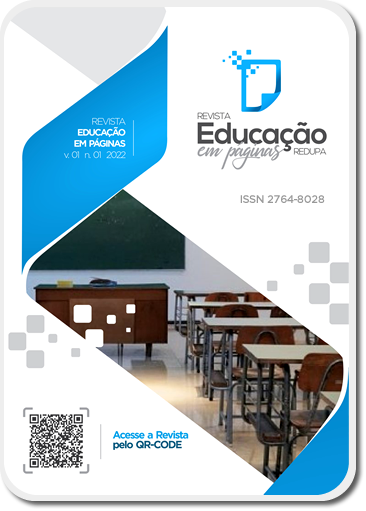Flatland on geogebra canvas: task design and implementation in the classroom
DOI:
https://doi.org/10.22481/redupa.v1.11363Keywords:
social justice, geometry, literary resourceAbstract
This article presents a didactic design framed in the perspective of the Teaching of Mathematics for Social Justice. A story created from the novel Flatland, to address geometry topics of the basic secondary education curriculum, is used as a resource. The design consists of a task and the analysis of its implementation from five practices. It is concluded about the interdisciplinary potential provided by the adopted perspective as well as the value and significance of the inclusion of technology in the classroom.
Downloads
References
ABBOTT, E. Planilandia. Barcelona: Laertes Ediciones, 2016. 144 p.
AUTOR 2; AUTOR 3. Artículo publicado en revista especializada con evaluación por pares. Mención especial en concurso. 2020.
AUTOR 2; AUTOR 3. Artículo publicado en revista especializada indizada con evaluación por pares. 2019.
AUTOR 3. Cápítulo de libro con evaluación por pares. En M. CASARÍN y P. ARÁN. 2019.
CARRIÓN, T.; AUTOR 2; AUTOR 3. Capítulo de libro con evaluación por pares. En: G. BUENDÍA; AUTOR 2; AUTOR 3 (Comps.), 2019.
COLOMBO, A. Un Mundo Feliz: El Lugar de la Realidad en el Álgebra Lineal. En G. BUENDÍA, AUTOR 2; AUTOR 3 (Comps.), Estrechando lazos entre investigación y formación en Matemática Educativa. Volumen IV. Montevideo: CFE, 2017, p. 53-69.
DOLGAY, M.; AUTOR 3. Capítulo de libro con evaluación por pares. En: G. BUENDÍA; AUTOR 2; AUTOR 3 (Comps.), 2016.
FELTON–KOESTLER, M. Mathematics education as sociopolitical: prospective teachers’ views of the What, Who, and How. Journal of Mathematics Teacher Education, Netherlands, v. 20, n. 1, p. 49–74, feb. 2017.
GUTSTEIN, E. Reading and writing the world with mathematics: Toward a pedagogy for social justice. New York: Routledge, 2006. 272 p.
SCHAFFEL, V.; AUTOR 3. Capítulo de libro con evaluación por pares. En: G. BUENDÍA; AUTOR 2; AUTOR 3 (Comps.), 2016.
SKOVSMOSE, O. Alfabetismo matemático y globalización. En P. VALERO y O. SKOVSMOSE (Eds.). Educación matemática crítica. Una visión sociopolítica del aprendizaje y la enseñanza de las matemáticas. Bogotá: Una empresa docente, 2012, p. 65-105.
STEIN, M.; ENGLE; R.; SMITH, M. ; HUGHES, E. (2008). Orchestrating Productive Mathematical Discussions: Five Practices for Helping Teachers Move Beyond Show and Tell. Mathematical Thinking and Learning, Philadelphia, v. 10, n. 4, p. 313-340, oct. 2008. DOI: 10.1080/10986060802229675.
SPIRA, M. Contextualização ou insensatez? Revista do Professor de Matemática, Río de Janeiro, v. 63, p. 14, 2008.
WITTMANN, E. Connecting Mathematics and Mathematics Education. Switzerland: Springer, 2021. 332 p.
ZASLAVSKY, O. Open-ended tasks as a trigger for mathematics teachers’ professional development. For the Learning of Mathematics, New Westminster, v. 15, n. 3, p. 15-20, nov. 1995
ZAZKIS, R.; LILJEDAHL, P. Teaching Mathematics as Storytelling. Rotterdam: Sense Publishers, 2009. 140 p.
Downloads
Published
How to Cite
Issue
Section
License
Copyright (c) 2022 Julieta Díaz, Verónica Molfino, Cristina Ochoviet, Jéssica Vizcaíno

This work is licensed under a Creative Commons Attribution 4.0 International License.






